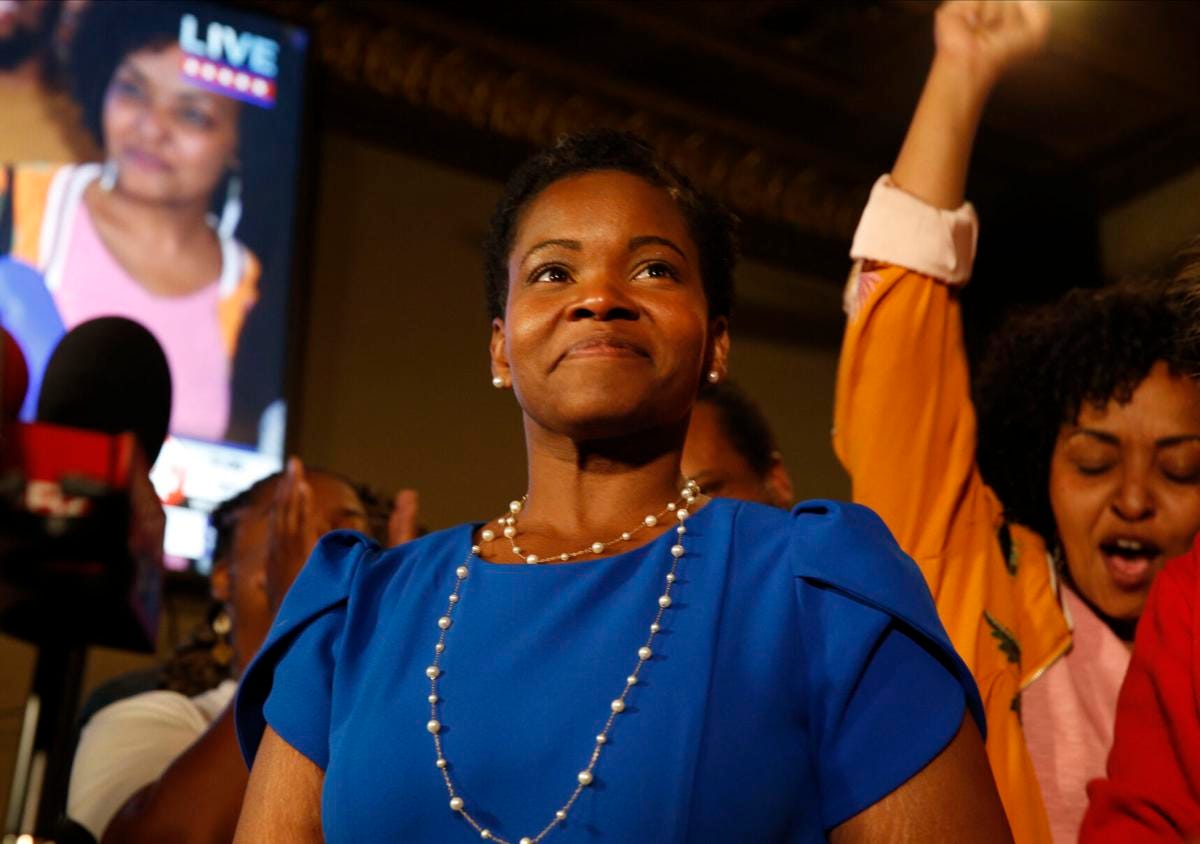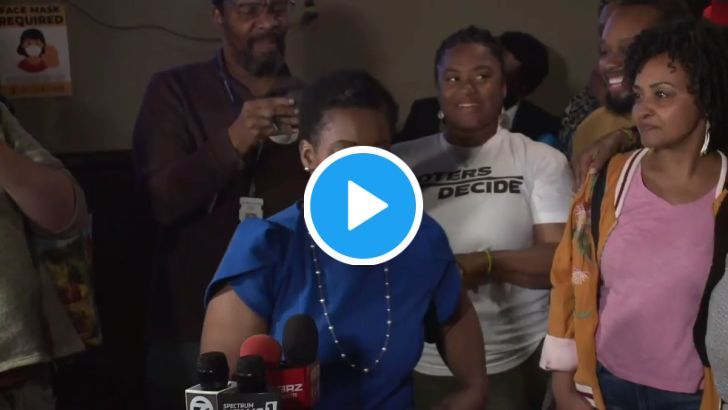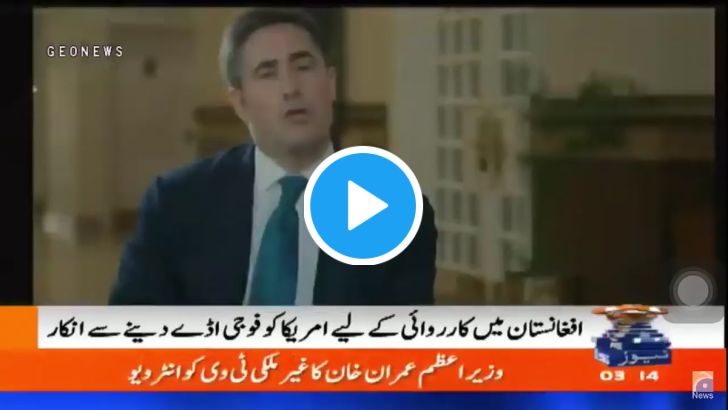Global Roundup: India Walton Making History in Buffalo, Trans Rights in Hong Kong, Outrage at PM Imran Khan’s Comments about Rape, Desi Rainbow Parents and Allies, Empowering Latine Voices
Compiled by Inaara Merani
Democratic Buffalo mayoral primary candidate India Walton delivers her victory speech on Tuesday June 22, 2021. Photo Robert Kirkham via Buffalo News
On Tuesday, she defeated a four-term incumbent in the Democratic primary in New York state’s second largest city. Walton said she believes it happened because Buffalo's economic "renaissance" in recent years hasn't reached everyone.
It's been 16 years, and though we've seen progress in certain areas, there are a lot of people, the majority of us have not enjoyed in what is being called 'the renaissance. I think that now is a time where people are standing up and saying that we're not going to take this lying down. The status quo is not enough and people just want change. - India Walton
Walton’s platform outlines plans to tackle a local affordable housing crisis and declare Buffalo a sanctuary city for immigrants, which limits a local jurisdiction’s cooperation with federal enforcement of immigration law. And also the intention to convert the city’s fleet of public vehicles to electric cars in an effort to address climate change.
One of her key proposals foreshadows sweeping reforms to “public safety”, focusing on harm prevention, restorative justice and the root causes of crime instead of punitive action, according to her campaign platform.
Under her watch, police will no longer respond to most mental health calls and will stop enforcing low-level drug possession offenses. She also intends to require unpaid leave for officers under investigation for police brutality, among other measures.
——————————————-
Some of the founding members of the transgender rights organisation Quarks, in Hong Kong | Rain TYH. All rights reserved. (Open Democracy)
In Hong Kong, LGBTQ+ discourse is highly taboo. It is rarely discussed and the community is often othered. In their everyday lives, trans people face many difficulties accessing healthcare services, among others, and there are currently no laws in place to protect against gender identity-related discrimination. Despite these conservative views, however, this generation is changing these views and is breaking down barriers.
Ming Chan was assigned male at birth, but always knew that she was a woman. She never felt like she could talk to her family and only conversed with other trans people online. Upon seeing a psychiatrist in her third year of university, she was encouraged to consider hormone treatments. It was also at this time when she decided to come out to her family who struggled at first, but have ultimately been supportive. Chan is among many other young people in Hong Kong who have begun speaking out about gender identity and fighting for inclusion.
Last year, Chan and a number of transgender activists founded Quarks, a support group for trans and non-binary young people navigating trans issues. It now has more than 80 active members between the ages of 14 and 30, and more than 1000 followers on social media. Quarks not only offers peer support to these individuals and advocates for their rights, but it also strives to push back against Hong Kong’s attachment to gender norms.
Now that I’ve chosen a different way to live, I’m more open to opportunities. I’m more willing to get to know people who are different. I have more freedom in expressing myself...The world has become bigger. - Ming Chan
Last month, the Chinese University of Hong Kong found that more than 50% of trans people have faced discrimination at work in in their studies, and 75% have experienced social rejection and suicidal ideation. Physical, emotional, verbal, and sexual abuse are also often experienced by the trans community.
Accessing hormone treatments is also quite difficult for those under 18, and many must resort to private clinics which can be expensive as there is currently only one public clinic open in Hong Kong. With a lack of healthcare services and basic everyday services, the trans community in Hong Kong faces many difficulties.
Transgender youth represent many possibilities and are challenging the ideology of our rigid gender system. This provides hope for the community...The hardware is moving very slowly – but people are trying to find a new way out. - Ming Chan
In a space where trans and non-binary people are invisible, Quarks hopes to build a safe space where everyone feels included and represented.
Subscribe now
———————————
Via Dawn
Pakistani Prime Minister Imran Khan is yet again victim-blaming and perpetuating rape culture. In a recent interview, the PM attributed sexual violence to the amount of clothing a woman wears, stating that “men aren’t robots” and they’re bound to act on their desires. Disgusting.
Many took to Twitter to express their outrage at the PM’s comments. This is the second time in two months that Khan’s comments have sparked outrage. In April, he said that wearing a veil would protect women from sexual assault.
In Pakistan, there are high rates of sexual violence, which the PM has failed to combat in the three years since he was elected into office. Around 1000 women in Pakistan are killed every year in “honour killings” for supposedly violating conservative and traditional norms of love and marriage.
The epidemic of gender and sexual-based violence is ongoing in Pakistan and it is apparent that PM Imran Khan is doing nothing to eradicate the issue, given that he is a misogynistic rape-apologist. While the battle to overcome this plague will be a difficult one, activists across Pakistan and the world are determined to put this issue to an end and ensure that women and girls in Pakistan are afforded the safety and security they rightfully deserve.
—————————————-
(Desi Rainbow)
LGBTQ+ issues remain very taboo in South Asian communities. When children come out to their parents, it can be difficult to grasp due to prevailing cultural norms, however a group of South Asian parents created an organization to support the South Asian diaspora in navigating these issues, called Desi Rainbow Parents and Allies.
Extended family, immigrant community, religious community, it’s more important in the South Asian context than in other communities...Even if you want to be personally supportive, you’re made to feel shame. Any time I said those words [like trans or queer], there was a sense of real fear and shame. Some extended family members told me they pity me. - Aruna Rao, founder of Desi Rainbow Parents and Allies
Desi Rainbow Parents and Allies was created in 2017 for South Asian families and friends of the LGBTQ+ community interested in learning about LGBTQ+ issues and learning how to foster community in order to better support their loved ones. Similar to Parents and Friends of Lesbians and Gays (PFLAG), this organization strives to support and guide these individuals in search of knowledge and looking for ways to strengthen their solidarity with the community.
Every month, online support and discussion groups are held online where free educational programs are offered. One of the programs is called Proud Possibilities, which features LGBTQ+ possibility models and hosts speaker events featuring topics such as mental health, raising transgender children, and more.
Founder Aruna Rao attended many community meetings to learn more about the LGBTQ+ community, but felt unrepresented in these predominantly white spaces.
I found myself the only brown immigrant mother in the whole space. And even though I’m used to being the only brown person in all-white spaces, it felt different for emotional support.- Aruna Rao
After joining a PFLAG group for Asians and Pacific Islanders, she made connections with other Asian parents, but was still left feeling unrepresented and as if she was going through this experience alone. This is when she decided to create Desi Rainbow Parents and Allies, with the help of the National Queer Asian Pacific Islander Alliance. Rao started a Facebook group in 2017 centred around the South Asian community in New Jersey, but began receiving calls from parents from around the world, such as from Canada and Hong Kong. She decided to quit her job and continue this full time in 2018. When the COVID-19 pandemic struck, the team at Desi Rainbow chose to move things online. with the presence increasing from 150 to 850 people from countries around the world. At these online meetings, individuals can mute their audio and video in order to remain anonymous, which has encouraged many more individuals to attend.
Attending these sessions has supported a number of South Asian individuals looking to strengthen their knowledge on LGBTQ+ issues, and become a better ally. With the pandemic subsiding, it is possible that these sessions will be moved in-person. It is evident, however, that the online sessions have supported hundreds across the world and will continue to do so.
—————————————
Jackson Davis; Ojala Ignition Lab (Deadline)
Tanya Saracho is a Mexican-American actress, playwright, and screenwriter who is empowering Latine voices through writing. After recently signing a deal with Universal Content Productions, Saracho established Ojalá Ignition Lab, a 26-week incubation program which is designed to nurture, amplify, guide and empower intersectional Latine voices.
Saracho will mentor these participants herself, along with experienced showrunners and executive producers. The lab will be a culturally safe environment where writers can gain industry insight to support their work.
This is a legit writing lab, and I’m so thrilled. I don’t know if there’s something like this out there — it’s a nurturing writers’ group. - Tanya Saracho
Latine voices are often left unheard, especially in the film industry. Prevailing stereotypes dominate Latine narratives in virtually every movie or TV show. Saracho noted that when Latine writers contribute to scripts about Latine culture, they may feel like they have to defend their culture, ethnicity or race, or they have to act as an ambassador to their Latine identity. In writing about one’s own culture, they should never have to feel such a way.
This program will enable emerging writers with the ability to effectively and creatively craft scripts which will be representative of their identities. This intersectional program will ensure that all Latine voices are amplified, such as the Afro-Latine community.
It’s like when you see yourself represented after not being, you know, after never seeing yourself represented. It’s just an alchemy-like of safety that you can build, and we haven’t historically as Latines been building that way because we’re not enough of us in this industry to be surrounded by the same. - Tanya Saracho
————————————
Inaara Merani (she/her) is a recent graduate from the University of Ottawa where she studied International Development and Globalization with a minor in Women’s Studies. She is an Ismaili Muslim Canadian who is deeply passionate about human rights, social justice and feminism, and in turn, dismantling the patriarchy and ensuring that all women have safe and equal access to all their rights. She hopes to pursue a career in law so that she can continue to fight for the rights of women and other marginalized groups everywhere. She also enjoys reading, travelling and spending time with her beautiful cat.










Hello, I'm not sure how else to contact, apologies if this is not the right place for this question - did you recently post a story about Japanese women buying obis made by Afghan women. If this is correct, can you link me back? I'm unable to find it right now. Thank you for all of your amazing work.